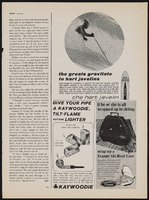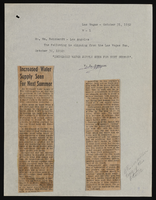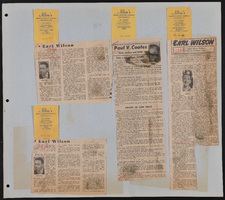Search the Special Collections and Archives Portal
Search Results

Meeting minutes for Consolidated Student Senate, University of Nevada, Las Vegas, April 03, 1979
Date
Archival Collection
Description
Text
Bureau of Reclamation Photographs of the Hoover Dam and Boulder City, Nevada
Identifier
Abstract
The Bureau of Reclamation Photographs of the Hoover Dam and Boulder City, Nevada depict the construction of the Hoover (Boulder) Dam and the development of Boulder City, Nevada from 1869 to 1974, with a bulk of the materials dating from 1929 to 1940. The photographs primarily depict the construction operations in Black Canyon, including digging tunnels, pouring concrete, building the power plant, and inspections by Bureau of Reclamation engineers. The photographs also depict Boulder City, including schools, workers, and dormitories. The collection also includes photographs of St. Thomas, Nevada, Lake Mead, Nelson’s Landing, Nevada, and an archaeological excavation near Lake Mohave, Nevada.
Archival Collection

Transcript of interview with Fred B. Houghton by Philip Partridge, February 9, 1975
Date
Archival Collection
Description
On February 9, 1975, Philip Partridge interviewed former attorney, Fred B. Houghton (born August 27th, 1894 in Chicago, Illinois) in his home in Las Vegas, Nevada. The two discuss how Houghton first moved to Las Vegas and how he came to practice law. The interview concludes with Houghton’s thoughts of Southern Nevada.
Text
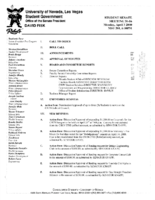
Meeting minutes for Consolidated Student Senate, University of Nevada, Las Vegas, April 03, 2000
Date
Archival Collection
Description
Text
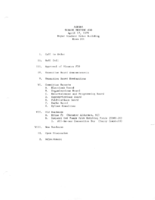
Meeting minutes for Consolidated Student Senate, University of Nevada, Las Vegas, April 17, 1979
Date
Archival Collection
Description
Text

Transcript of interview with Todd Jones by Claytee White, January 7, 2010
Date
Archival Collection
Description
In 1991, Todd Jones arrived in Las Vegas to become a professor of philosophy at University of Nevada Las Vegas. He immediately liked the John S. Park neighborhood, where he had friends—members of a poetry group and other professors. He was attracted to the vintage esthetics and the feel of streets lined with large trees. It was a contrast with the explosion of homes being built in the city during the 1990s. Todd knew if ever bought a house, it would be there. In 2000 he did. He describes his impressions of the neighborhood's history as an old Mormon area. He also classifies the residents as being members of what her describes as three or four very distinct populations: "urban professionals, old Mormons, professors and lots of immigrants from Mexico. Todd talks about the neighborhood website that once existed and his impression of the political leanings of residents. At one point he worked as a Democrat precinct captain.
Text
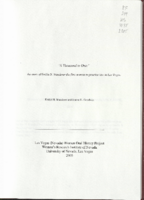
Transcript of interview with Emilie Wanderer by Joanne Goodwin, 2000
Date
Archival Collection
Description
Emilie Wanderer was the first woman to establish a law practice in Las Vegas. She also helped to start a family court in Nevada with a social worker and a marriage counselor on staff. She and her son John were the first mother-son team to practice law in Nevada.
Text

